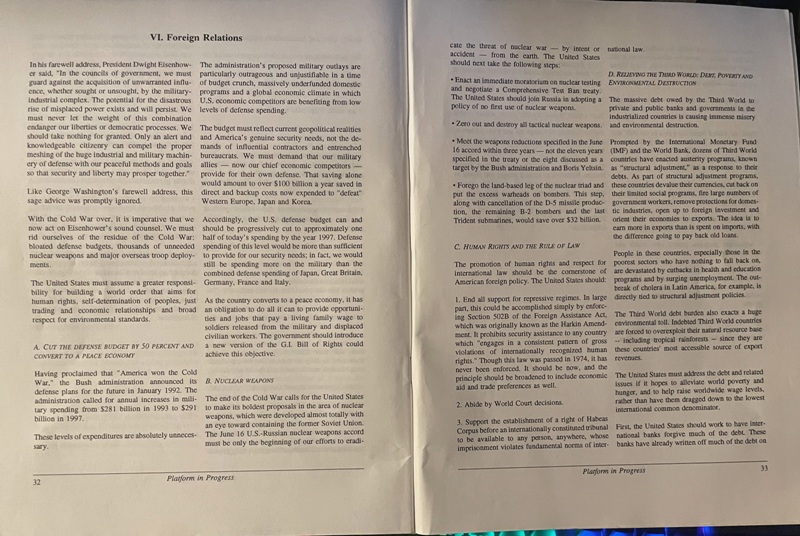File:Platform in Progress Presidential Campaign Jerry Brown 1992 Foreign Relations.jpg
Platform_in_Progress_Presidential_Campaign_Jerry_Brown_1992_Foreign_Relations.jpg (800 × 536 pixels, file size: 185 KB, MIME type: image/jpeg)
1992 Presidential Campaign Platform
- of Governor Edmund G. 'Jerry' Brown Jr.
* https://www.greenpolicy360.net/w/File:Jerry_Brown_92_Presidential_Platform_We_the_People.jpg
························································································································
Excerpt from the Brown for President "Platform in Progress" - 1992
IV. Foreign Relations
In his farewell address, President Dwight Eisenhower said, "In the councils of government, we must guard against the acquisition of unwarranted influence, whether sought of unsought, by the military-industrial complex. The potential for the disastrous rise of misplaced power exists and will persist. We must never let the weight of this combination endanger our liberties or democratic process. We should take nothing for granted. Only an alert and knowledgeable citizenry can compel the proper meshing of the huge industrial and military machinery of defense with our peaceful methods and goals so that security and liberty may prosper together."
Like George Washington's farewell address, this sage advice was promptly ignored.
With the Cold War over, it is imperative that we now act on Eisenhower's sound counsel. We must rid ourselves of the residue of the Cold War: bloated defense budgets, thousands of unneeded nuclear weapons and major overseas troop deployments.
The United States must assume a greater responsibility for building a world order that aims for human rights, self-determination of peoples, just trading and economic relationships and broad respect for environmental standards.
A. CUT THE DEFENSE BUDGET BY 50 PERCENT AND CONVERT TO A PEACE ECONOMY
Having proclaimed that "America won the Cold War," the Bush administration announced its defense plans for the future in January 1992. The administration called for annual increases in military spending from $281 billion in 1993 to $291 billion in 1997.
These levels of expenditures are absolutely unnecessary.
The administration's proposed military outlays are particularly outrageous and unjustifiable in a time of budget crunch, massively underfunded domestic programs and a global economic climate in which U.S. economic competitors are benefiting from low levels of defense spending.
The budget must reflect current geopolitical realities and America's genuine security needs, not the demands of influential contractors and entrenched bureaucrats. We must demand that our military allies -- now our chief economic competitors -- provide for their own defense. That saving alone would amount to over $100 billion a year saved in direct and backup costs now expended to "defeat" (and "protect") Western Europe, Japan and Korea.
Accordingly, the U.S. defense budget can and should be progressively cut to approximately one half of today's spending by the year 1997. Defense spending of this level would be more than sufficient to provide for our security needs; in fact, we would still be spending more on the military than the combined defense spending of Japan, Great Britain, Germany, France and Italy.
As the country converts to a peace economy, it has an obligation to do all it can to provide opportunities and jobs that pay a living family wage to soldiers released from the military and displaced civilian workers. The government should introduce a new version of the G.I. Bill of Rights that could achieve this objective.
B. NUCLEAR WEAPONS
The end of the Cold War call for the United States to make its boldest proposals in the area of nuclear weapons, which were developed almost totally with an eye toward containing the former Soviet Union. The June 16 U.S.-Russian nuclear weapons accord must be only the beginning of our efforts to eradicate the threat of nuclear war -- by intent or accident -- from the earth. The United States should next take the following steps:
- Enact an immediate moratorium on nuclear testing and negotiate a Comprehensive Test Ban treaty. The United States should join Russia in adopting a policy of no first use of nuclear weapons.
- Zero out and destroy all tactical nuclear weapons.
- Meet the weapons reductions specified in the June 16 accord within three years -- not the eleven years specified in the treaty or the eight discussed as a target by the Bush administration and Boris Yeltsin.
- Forego the land-based leg of the nuclear triad and put the excess warheads on bombers. This step, along with cancellation of the D-5 missile production, the remaining B-2 bombers and the last Trident submarines would save over $32 billion.
C. HUMAN RIGHTS AND THE RULE OF LAW
The promotion of human rights and respect for international law should be the cornerstone of American foreign policy. The United States should:
1. End all support for repressive regimes. In large part, this could be accomplished simply by enforcing Section 502B of the Foreign Assistance Act, which was originally known as the Harkin Amendment. It prohibits security assistance to any country which "engages in a consistent pattern of gross violations of internationally recognized human rights." Though this law was passed in 1974, it has never been enforced. It should be now, and the principle should be broadened to include economic aid and trade preferences as well.
2. Abide by World Court decisions.
3. Support the establishment of a right of Habeas Corpus before an internationally constituted tribunal to be available to any person anywhere, whose imprisonment violates fundamental norms of international law.
~
File history
Click on a date/time to view the file as it appeared at that time.
| Date/Time | Thumbnail | Dimensions | User | Comment | |
|---|---|---|---|---|---|
| current | 21:06, 26 January 2022 |  | 800 × 536 (185 KB) | Siterunner (talk | contribs) |
You cannot overwrite this file.
File usage
The following 3 pages use this file:

